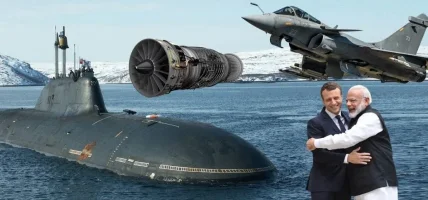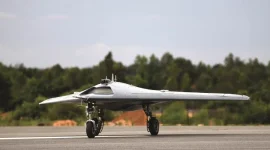
The recent drone strike in Salavat, Russia, serves as a stark reminder of the rapidly evolving landscape of modern warfare. The incident underscores the growing significance of drone technology in military operations, particularly in asymmetric warfare scenarios where a technologically inferior force can leverage relatively inexpensive drones to inflict disproportionate damage on a more advanced adversary.
This trend is not confined to the Ukrainian conflict. Across the globe, nations and non-state actors alike are recognizing the strategic potential of drones, leading to a proliferation of unmanned aerial vehicles (UAVs) across various domains. This has prompted countries like India to reassess their military doctrines and invest in cutting-edge drone technology to maintain a competitive edge in the 21st-century battlefield.
India's Drone Gameplan:
India has embarked on an ambitious program to bolster its drone capabilities across the spectrum, from surveillance and reconnaissance to offensive strikes. The Defence Research and Development Organisation (DRDO) is spearheading this effort, focusing on developing indigenous drone technology that can be tailored to India's unique security challenges.One of the key pillars of India's drone strategy is the Combat Air Teaming (CATS) program, which aims to integrate unmanned aerial vehicles with manned fighter aircraft to enhance combat effectiveness. The CATS Warrior, a loyal wingman drone, is a flagship project under this program. It is designed to operate in tandem with fighter jets, providing additional firepower, reconnaissance capabilities, and even serving as a decoy to divert enemy fire.
The CATS Warrior's most intriguing feature is its kamikaze mode, allowing it to be deployed as an expendable loitering munition (LAM) to strike high-value targets. This demonstrates India's willingness to embrace unconventional tactics and leverage the cost-effectiveness of drone technology to achieve strategic objectives.
In addition to the CATS program, India is also procuring a wide range of drones from international manufacturers, including Israel and the United States. These drones are equipped with advanced sensors, communication systems, and weapon payloads, enabling the Indian armed forces to conduct precision strikes, surveillance missions, and other critical operations with greater efficiency and reduced risk to human pilots.
Countering the Drone Threat:
While India is actively developing and acquiring offensive drone capabilities, it is also cognizant of the need to defend against the growing threat posed by hostile UAVs. The country is investing in counter-drone technology, including electronic warfare systems, directed energy weapons, and anti-drone missiles, to neutralize enemy drones before they can inflict harm.
Moreover, India is participating in international forums and collaborating with other nations to establish norms and regulations for the responsible use of drone technology. This includes efforts to prevent the proliferation of weaponized drones to non-state actors and to ensure that the use of drones in armed conflict adheres to international humanitarian law.
The Future of Drone Warfare:
As drone technology continues to advance at an unprecedented pace, the future of warfare is likely to be characterized by an increasing reliance on unmanned systems. Drones will play a pivotal role in intelligence gathering, surveillance, target acquisition, and offensive strikes, fundamentally altering the dynamics of conflict.India's proactive approach to drone development and deployment positions it well to navigate this evolving landscape. By investing in both offensive and defensive drone capabilities, India is ensuring that it remains a formidable force in the 21st-century battlefield. The country's commitment to responsible drone use and its participation in international efforts to regulate this technology further underscore its commitment to global peace and security.


